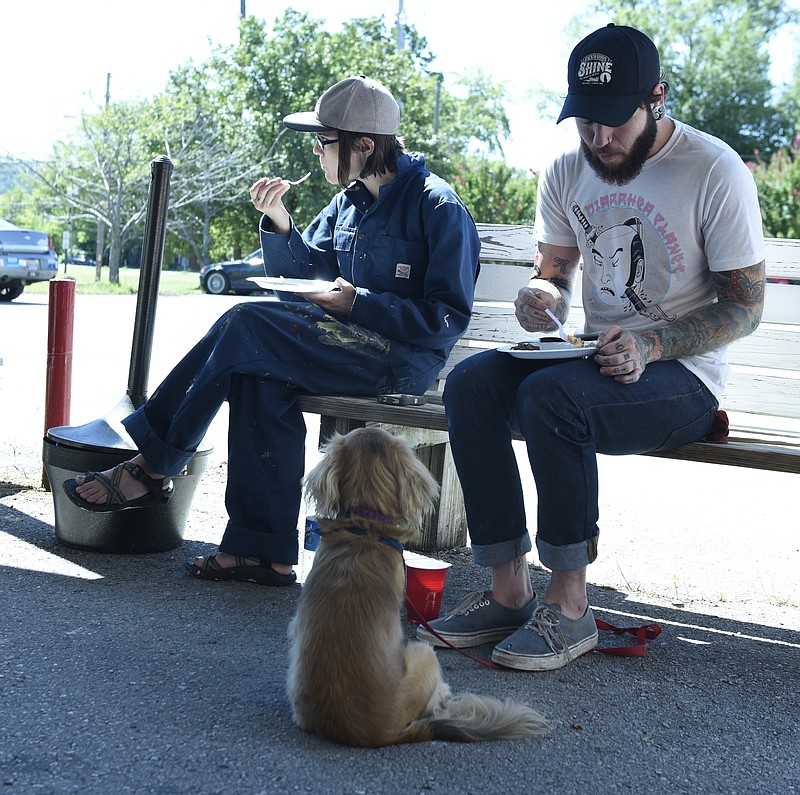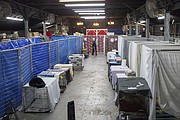View other columns by David Cook
Besides the wise men, grungy shepherds and laboring Mary and Joseph, animals, too, were at the stable that night in Bethlehem.
Not only were animals there at the Nativity, but they were there first. The stable exists as a place for animals; it is their sanctuary, not ours. Mary and Joseph were visitors there, which means that of all the places God could have scripted for the backdrop for this Christ story - Mary just as easily could have delivered in a widow's home, or riverbank, or cave, even - God not only chose a stable, but orchestrated a manger, a feed trough for animals, as the place for the Christ child to first lay his head.
Why?
Because animals are beloved, too.
Because the good news is theirs, too.
"None of us are forgotten by our creator," said Beth Foster. "Not even those who have fur, feather or fins."
Earlier this fall, Foster, co-director of the Mercy Junction's Justice and Peace Center at St. Andrew's, delivered a sermon at Renaissance Presbyterian on the connection between the animal kingdom and the kingdom of God. (Read the Oct. 2 sermon at followlovebe.wordpress.com).
"Jesus' life, Jesus' death, Jesus' resurrection - the good news for a broken world - these were not just for me, not just for humankind, but for all creation," Foster said.
What a joy to realize that. When we let them, animals have a power to teach and heal us, a power to remind us of the things we don't know, keeping our hubris in check, awakening awe at our Creator and creation.
Research continues to prove animals are sentient beings, complete with thoughts, memories, wounds, joys and full lives. This fuller understanding of animals, and their legal rights, will become a commonplace discussion in the 21st century, and believers need to find their place within that discussion.
We are called to restore the relationship between animal, earth and human.
"That right relationship, that calling to mercy, gentleness and peace, is contrary to a system that says everything must have economic value, that every life must turn a profit, that even creation is a commodity," said Foster. "But our faith - that good news - is, and should, be contrary to that system."
God, who created all of life, thus loves all of life. God's eye is on the beloved sparrow and the giraffe, the rhino, Sumatran elephant, Galapagos penguin, orangutan and the great shark.
Yet each of those animals, from the giraffe down to the shark, are under attack. Their habitats destroyed, tusks bartered like cheapware, fins sliced up for soup. Their critical endangerment comes from their most feared predator.
Us.
Our faith must speak to such a fractured relationship; otherwise, it is a faith that's inadequate and incomplete.
"Our is a faith that calls us to grace, mercy, gentleness and peace," Foster said. "Doesn't that extend to our relationships with our non-human sisters and brothers, to the very earth, all of which is God's creation - all of which God saw and God said was good?"
Do not read this as a critique of farmland America. Nor of the stockyard owner. Nor of the deer hunter.
The violence within America inflicted on animals is found within the corporate factories and feed lots, the places animals are warehoused, tortured and slaughtered, their divinely created existence reduced to the meagerest terms: to fatten up, then appear on a plate.
"Walmart or McDonald's shapes the living conditions of more animals in a day than an animal shelter does in a decade," Nicholas Kristof wrote in the New York Times.
It is into that world the believer must go.
So much of our disease and unease comes from faulty relationships: to the earth, our bodies, the animal kingdom. How much of our own discomfort and sickness would end if we only began to treat animals not as cogs in an economic system (for example, the vacuous "Eat More Chikin") but as beloved and holy creatures who, too, will graze and gallop at the right hand of God.
This Christmas, we must not forget that the birth of Christ was presided over not only by humans, but animals.
Christ is theirs, too.
David Cook writes a Sunday column and can be reached at dcook@timesfreepress.com or 423-757-6329. Follow him on Facebook at DavidCookTFP.


